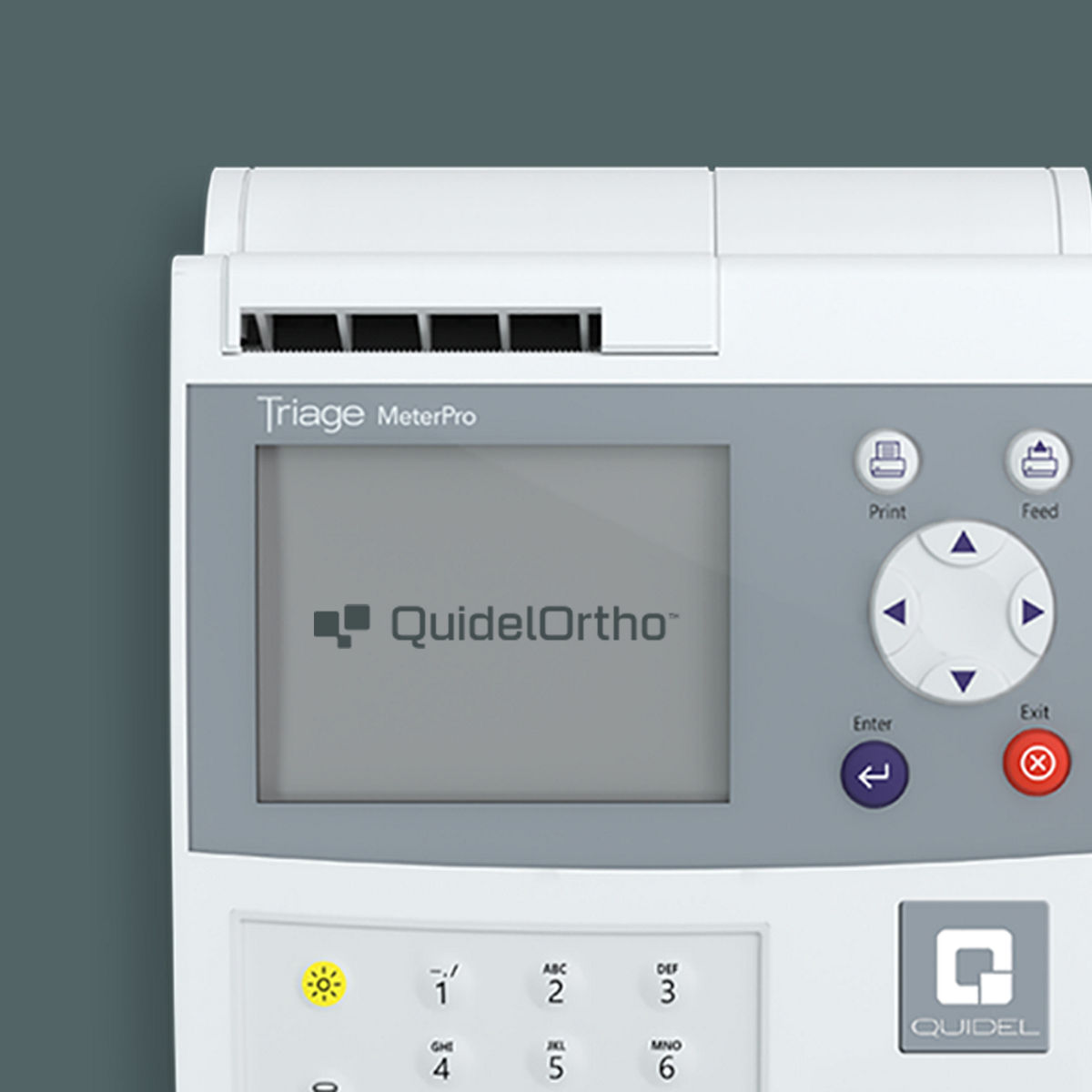Key figures to know
About ...
20 M
people die every year worldwide from cardiovascular disease1
10%
of ED non-injury visits are linked to chest pain2
50%
of patients with myocardial infarction can be NSTEMI3

Don't compromise
When it comes to the aid in the diagnosis of myocardial infarction, TriageTrue test makes no compromise and combines high-sensitivity troponin I results with a rapid point-of-care measurement in less than 20 minutes.
It offers quantitative determination of troponin I with high-sensitivity performance comparable to that of central laboratory tests.
A true solution for improved patient management
1. State-of-the-art biomarker
2. Faster rule-in/rule-out
3. Point-of-care test with lab quality
1. State-of-the-art biomarker
True high-sensitivity cTnI assay
Troponin is the state-of-the-art biomarker for myocardial injury when tested with high-sensitivity assays.4
With TriageTrue test this is now available at the bedside.
TriageTrue test fulfills all requirements of high-sensitivity cardiac troponin assays as published by the IFCC.4,5
TriageTrue test analytical performances
Analytical precision5
Analytical precision of <10% CV at the 99th percentile URL.
| Population | 99th percentile URL | CV |
| Overall | 20.5 ng/L | 5.60% |
| Female | 14.4 ng/L | 5.90% |
| Male | 25.7 ng/L | 5.40% |
Analytical sensitivity5, 9
Measures 72% of a healthy reference population above the Limit of Detection.
| Population | Plasma | Whole blood |
| Limit of Blank (LOB) | 0.6 ng/L | 0.6 ng/L |
| Limit of Detection (LOD) | 1.5 ng/L | 1.7 ng/L |
| Limit of Quantitation 20% CV | 2.1 ng/L | 2.8 ng/L |
| Limit of Quantitation 10% CV | 4.6 ng/L | 6.2 ng/L |
“The point of care whole blood TriageTrue test demonstrates imprecision levels consistent with high-sensitivity characteristics. The TriageTrue point-of-care hs-TnI clinical performance is equivalent to an established and well-validated laboratory hs-TnI.”7
Educational videos
Prof. Paul Collinson
about the interest and tremendous advantage of using hsTnI POC.
Professor on cardiovascular biomarkers and honorary consultant cardiologist, St Georges’s University Hospitals in London.
Dr. Ahmed Dakshi
about the results of the prospective MACROS’s study performed on whole blood confirming that TriageTrue tests fulfill the criteria of a hsTnI test with comparable performance as in lab testing.
Cardiologist research fellow, Liverpool University Hospital.
Dr. James Hatherley
about his experience with the ease of use of TriageTrue assay and the benefits of having a rapid POC test to risk stratify patients with chest pain.
Cardiology registrar, Liverpool University Hospital.
TriageTrue test in the media
- First Point-of-Care hs-Troponin I Assay Matches Lab-Based Tests
- High-Sensitivity Troponin Promising for Point-of-Care Use— Quicker MI diagnosis possible in the emergency department for novel test
- Heart attack diagnosis at the bedside can now take as little as 20 minutes
- Sistema POCT per la determinazione su sangue intero della troponina cardiaca I ad alta sensibilità: quale valore nel territorio/ High-sensitivity Point of Care Testing (POCT) methods for Cardiac Troponins: analytical features and clinical relevance.
- Evaluation of the analytical performance of the Quidel TriageTrue High Sensitivity Troponin I Test on the Triage MeterPro Analyzer – Poster 3ème Journées Francophone de biologie médicale, 2019 C. Chenevier-Gobeaux et al, Paris
- Imprecision and clinical performance of a whole blood high sensitivity point of care troponin I: the first prospective real-time study in suspected acute coronary syndrome, Poster, A. Dakshi et al, Liverpool
- The time-saving impact of POCT high-sensitivity Troponin I in an Emergency Department, Poster CMD 2022, Riddoch et al, NHS UK
- Clinical and Operational Impact of POCT high-sensitivity Troponin I in an Emergency Department, Poster Medlab 2023, – Riddoch et al, NHS UK
Sources:
1. World Heart Federation. World heart report 2023 - Confronting the world’s number one killer. World-Heart-Report-2023.pdf. Accessed August 13, 2024. world-heart-federation.org
2. Stepinska J, Lettino M, Ahrens I, et al. Diagnosis and risk stratification of chest pain patients in the emergency department: focus on acute coronary syndromes. A position paper of the Acute Cardiovascular Care Association. Eur Heart J Acute Cardiovasc Care. 2020;9(1):76-89. doi:10.1177/2048872619885346
3. Puymirat E, Simon T, Cayla G, et al. Acute myocardial infarction: changes in patient characteristics, management, and 6-month outcomes over a period of 20 years in the FAST-MI Program (French Registry of Acute ST-Elevation or Non-ST-Elevation Myocardial Infarction) 1995 to 2015. Circulation. 2017;136(20):1908-1919. doi:10.1161/CIRCULATIONAHA.117.030798
4. Apple FS, Jaffe AS, Collinson P, et al. IFCC educational materials on selected analytical and clinical applications of high sensitivity cardiac troponin assays. Clin Biochem. 2015;48(4-5):201-3. doi:10.1016/j.clinbiochem.2014.08.021
5. Boeddinghaus J, Nestelberger T, Koechlin L, et al. Early diagnosis of myocardial infarction with point-of-care high-sensitivity cardiac troponin I. J Am Coll Cardiol. 2020;75(10):1111-1124. doi:10.1016/j.jacc.2019.12.065. Erratum in: J Am Coll Cardiol. 2020;75(23):3001. doi:10.1016/j.jacc.2020.05.003
6. Byrne RA, Rossello X, Coughlan JJ, et al. 2023 ESC Guidelines for the management of acute coronary syndromes. Eur Heart J. 2023;44(38):3720-3826. doi:10.1093/eurheartj/ehad191. Erratum in: Eur Heart J. 2024;45(13):1145. doi:10.1093/eurheartj/ehad870
7. Dakshi AA, Hatherley J, Collinson PO, et al. Imprecision and clinical performance of a whole blood high sensitivity point of care troponin I: the first prospective real-time study in suspected acute coronary syndrome. Eur Heart J. 2023;44(Suppl_2):ehad655.1259, doi:10.1093/eurheartj/ehad655.1259
8. Bajre M, Towse A, Stainthorpe A, Hart J. Results from an early economic evaluation of the use of a novel point of care device for diagnosis of suspected acute coronary syndrome patient within the emergency department in the National Health Service in England. Fortune Journals. 2021. doi:10.21203/rs.3.rs-148716/v1
9. Dakshi, A. et al. Evaluation of the analytical and clinical performance of a high-sensitivity troponin I point-of-care assay in the Mersey Acute Coronary Syndrome Rule Out Study (MACROS-2). Clin. Chem. Lab. Med. (CCLM) 63, 422–432 (2025).








